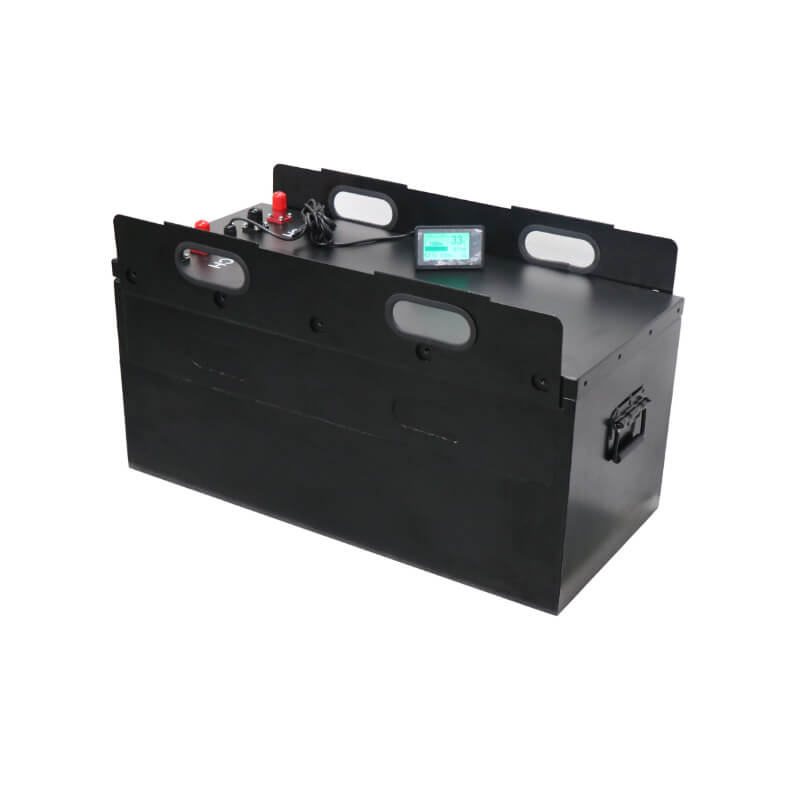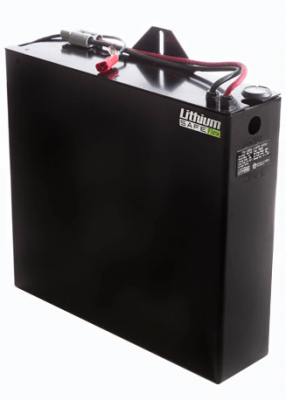Modern warehouses face immense pressure to maximize efficiency, with the global warehousing market projected to grow to $605 billion by 2025 due to the e-commerce boom and demand for faster deliveries.
Efficient battery technology is crucial for optimizing warehouse workflows. Forklifts, essential for moving goods, rely heavily on their batteries. Traditional lead-acid batteries have limitations like long charging times and high maintenance. Lithium-ion batteries offer a superior alternative with faster charging, longer runtimes, and reduced maintenance.
We’ll explores how lithium ion forklift battery,enhance warehouse operational efficiency. We’ll examine improvements in charging times, productivity, maintenance, safety, and integration with warehouse management systems.
Enhancing Operational Efficiency with Lithium Forklift Batteries
Faster Charging Times
Reduction in Downtime
Lithium ion forklift batteries are a game-changer for warehouse efficiency because they charge much faster than traditional lead-acid batteries. While lead-acid batteries can take up to 8 hours to fully charge, lithium batteries are ready to go in just 1-2 hours. This quick charging means forklifts spend less time sitting idle and more time on the move. Whether it’s moving pallets, stacking goods, or restocking shelves, forklifts can get back to work sooner, helping to keep warehouse operations running smoothly and boosting overall productivity.
Opportunity Charging
Another great feature of lithium batteries is their ability to handle opportunity charging. Unlike lead-acid batteries that need to be fully charged before use, lithium batteries can be topped up during short breaks, like lunch hours or shift changes. This means forklifts can stay in action for important tasks like picking orders and handling materials without frequent delays. By keeping forklifts charged and ready, warehouses can avoid interruptions and maintain a steady flow of work, making operations more efficient and streamlined.
Increased Productivity in Warehouse Tasks
Consistent Power Output
Lithium forklift batteries are great because they deliver steady power throughout their entire charge. This means forklifts stay at peak performance for their whole shift, without any drop in power as the battery depletes. In a busy warehouse, this reliable power is essential for lifting heavy pallets, moving goods, and stacking items. With consistent power, forklifts can handle these tasks smoothly and accurately, making the entire warehouse operation more efficient.
Extended Runtime
Another big advantage of lithium batteries is their longer runtime. They last much longer per charge compared to lead-acid batteries, so forklifts can work for extended periods without needing frequent recharges. This means fewer interruptions for charging and more time for important warehouse tasks like order picking and shelf restocking. With fewer charging breaks, warehouses can keep operations running continuously, handle more tasks, and boost overall productivity.
Simplified Maintenance Processes
Maintenance-Free Operation
Lithium forklift batteries are incredibly low-maintenance. Unlike lead-acid batteries, they don’t need regular tasks like watering or balancing. This means warehouse staff can skip these time-consuming chores and focus on more important work. With no maintenance hassles, managing these batteries is straightforward, making warehouse operations much smoother.
Reduced Maintenance Downtime
Since lithium batteries don’t require frequent maintenance, forklifts spend more time in use. This results in less downtime and a more streamlined workflow. With less downtime for maintenance, forklifts stay operational longer, helping keep everything running smoothly in the warehouse.
Enhanced Safety and Efficiency in Daily Operations
Safety Features
Lithium forklift batteries are a lot safer because they don’t have the risks of acid spills or harmful gases. This makes them a great choice for warehouses where safety is a top concern. Without these risks, the work environment stays cleaner and safer for everyone.
Operational Efficiency
Using lithium batteries is not only safer but also simpler. Since they don’t need extra safety precautions like lead-acid batteries, there are fewer interruptions and less hassle. This keeps the workflow smoother and speeds up material handling, making warehouse operations more efficient
Energy Efficiency and Cost Savings
Higher Energy Density
Lithium forklift batteries are more energy-efficient. They store and use energy better, so forklifts can operate for longer periods on a single charge. This means fewer interruptions for charging and smoother warehouse operations, which helps reduce overall energy costs.
Lower Energy Costs
Lithium batteries consume less electricity during charging than lead-acid batteries. This can lead to a reduction in utility bills by up to 30%. The savings on energy costs can be redirected toward other warehouse improvements or operational needs.
Total Cost of Ownership (TCO)
When you consider the total cost of ownership, lithium batteries offer significant savings. For example, while a lead-acid battery might cost around $500 and last about 1,500 cycles, a lithium battery might cost around $1,200 but can last up to 3,000 cycles and require less maintenance. This longer lifespan and lower maintenance can result in a savings of up to $3,000 over the life of the battery. Cut replacement and maintenance costs while reducing energy use with lithium batteries, boosting your warehouse’s efficiency and savings. The money saved can be reinvested into other areas of the warehouse, enhancing overall efficiency and performance.
Integration with warehouse management system(WMS)
Smart Battery Management
Lithium batteries from Green Cubes integrate easily with Warehouse Management Systems (WMS). They provide real-time updates on battery health and performance, so warehouses can monitor battery status and address any issues before they disrupt operations. For instance, if a battery starts to perform poorly, the WMS will notify staff to take action. This ensures that forklifts—used for everything from picking orders to moving goods—stay reliable and ready to go.
Data-Driven Insights
With the data from lithium forklift batteries, the WMS can make smarter decisions about warehouse operations. It can schedule battery charging during quieter times to avoid affecting busy periods and direct forklifts based on their battery levels. This means tasks like moving inventory and restocking shelves are handled efficiently. Overall, these insights help warehouses use their equipment better, keep everything running smoothly, and boost overall efficiency.
Future Trends and Innovations in Warehouse Operations
Advancements in Lithium-Ion Technology
The future of lithium-ion batteries is looking bright with some exciting advancements on the horizon. Leading industrial battery manufacturers USA, like Green Cubes, are working on new technology that will make warehouse operations even better. We can expect faster charging times, larger battery capacities for longer use, and improved safety features. These updates will keep forklifts and other warehouse equipment running smoothly and efficiently.
Predicted Trends
Looking ahead, battery technology will continue to evolve, bringing even more benefits to warehouses. We’ll likely see batteries that charge quicker, last longer, and offer even more advanced features. These improvements will help make warehouses more productive, cut down on costs, and make overall operations smarter and more efficient.
Why Lithium Forklift Batteries Matter
To wrap things up, lithium ion forklift battery from Green Cubes and other leading industrial battery manufacturers USA bring major advantages to warehouse operations. They reduce downtime with faster charging and longer-lasting power, keeping forklifts in use and reducing interruptions. They also simplify maintenance, saving time and effort. Plus, with their safety features and energy efficiency, they help cut costs and create a safer work environment. Overall, these batteries make warehouses more efficient and cost-effective, leading to smoother and more productive operations.


